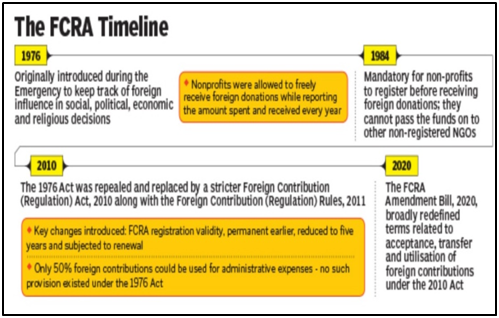Why in news?
The Ministry of Home Affairs (MHA) extended the validity of Foreign Contribution (Regulation) Act (FCRA) registration of NGOs and associations till June 30.
The Ministry has extended the validity of NGOs at least nine times since 2020 as the applications could not be processed within the stipulated time frame.
Registrations of many NGOs are up for renewal since September 29, 2020. The registration, mandatory to receive foreign funds, is renewed every five years.
What’s in today’s article?
- Foreign Contribution (Regulation) Act (FCRA)
What is the Foreign Contribution (Regulation) Act (FCRA)?
- Background:

- During the Emergency in 1976, the FCRA was enacted in response to concerns that foreign powers were interfering in Indian affairs by pumping money into the country through independent organisations.
- The law sought to regulate foreign donations to individuals and organisations in order for them to function in accordance with the values of a sovereign democratic republic.
- In 2010, the FCRA was amended to consolidate the law on the use of foreign funds and the Foreign Contribution (Regulation) Rules (FCRR), 2011, were notified.
- It is implemented by the Ministry of Home Affairs (MHA), which can prohibit the use of foreign funds for any activities detrimental to national interest.
- The law was amended again in 2020, giving the government tighter control and scrutiny over the receipt and use of foreign funds by NGOs.
- Salient features:
- The FCRA requires every person or NGO seeking to receive foreign donations to be:
- Registered under the Act.
- To open a bank account for the receipt of the foreign funds in State Bank of India, Delhi.
- To utilise those funds only for the purpose for which they have been received and as stipulated in the Act.
- To file annual returns and must not transfer the funds to another NGO.
- The Act prohibits the receipt of foreign funds by
- Candidates for elections,
- Journalists or newspaper and media broadcast companies,
- Judges and government servants,
- Members of legislature and political parties or their office-bearers, and
- Organisations of a political nature.
- Registration under FCRA:
- NGOs seeking foreign funding must submit an online application in a prescribed format, along with the necessary documentation.
- Individuals or organisations with specific cultural, economic, educational, religious, or social programs are eligible for FCRA registration.
- Following the NGO's application, the MHA conducts background checks on the applicant through the Intelligence Bureau and processes the application accordingly.
- The MHA must approve or deny the application within 90 days.
- FCRA registration is valid for 5 years after it is granted. NGOs are expected to apply for renewal within 6 months of their registration expiry date.
- Cancellation of registration:
- The government reserves the right to revoke any NGO's FCRA registration if it discovers a violation of the Act.
- Registration can be revoked if -
- The NGO has not engaged in any reasonable activity in its chosen field for the benefit of society for two consecutive years or if it has become defunct.
- In the opinion of the Central Government, it is necessary in the public interest to revoke the certificate, etc.
- An audit uncovers irregularities in an NGO's finances, such as the misutilisation of foreign funds.
- No cancellation order can be issued unless the person or NGO involved has been given a reasonable opportunity to be heard.
- Once an NGO's registration is cancelled, it is ineligible for re-registration for 3 years.
- The ministry also has the authority to suspend an NGO's registration for 180 days pending an investigation and to freeze its funds.
- All government orders can be challenged in the High Court.










